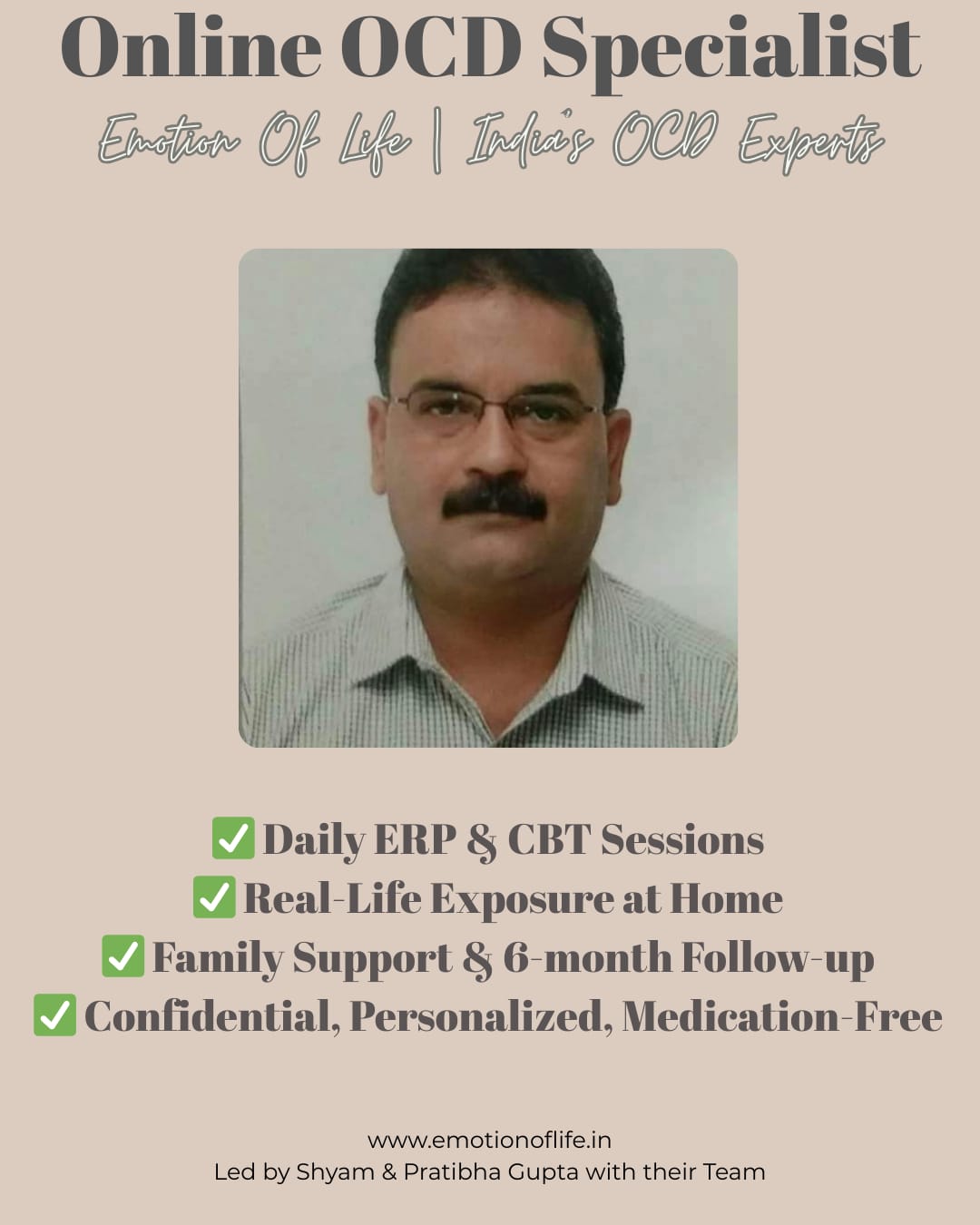Online OCD Specialist in India: Access, Structure, and Results
With digital platforms and remote care, online OCD specialists now deliver structured, evidence-based interventions that match traditional therapy in effectiveness while removing geographic barriers. Emotion of Life offers therapist-led online programs tailored to each person’s symptoms, routines, and goals.
Why “Online OCD Specialist” Matters
The shift to online care redefines access: individuals can now work with certified OCD professionals regardless of location. At Emotion of Life, treatment is customized to a person’s symptom profile and life circumstances, ensuring relevance and continuity.
Understanding OCD: A Functional Lens
OCD involves distressing, unwanted thoughts (obsessions) that drive repetitive mental or physical actions (compulsions) to neutralize anxiety or avert imagined harm. The cycle—obsession → anxiety → compulsion → brief relief → recurrence—disrupts routines, relationships, study/work, and well-being.
Modern treatment interrupts this learned pattern using structured behavioural and cognitive strategies (e.g., ERP and CBT), as implemented by Emotion of Life’s online specialists.
Why the Online Model Works Especially Well for OCD
- Accessibility to specialists: OCD has many subtypes (contamination, harm, checking, symmetry, religious/scrupulosity, existential, sexual intrusive thoughts, etc.). Platforms like Emotion of Life connect clients with ERP/CBT-trained specialists independent of geography.
- Consistency and frequency: Daily, structured sessions over weeks or months maintain momentum, helping reprogram thought–behaviour patterns.
- Real-time, real-life integration: Many triggers are at home, work, or school. Online sessions enable guided exposures in the client’s actual environment for higher transfer to daily life.
- Privacy and reduced stigma: Receiving care at home supports comfort, autonomy, and adherence, with confidentiality via secure video.
Structure of an Effective Online OCD Recovery & Cure Program
- Initial Assessment: Comprehensive evaluation (subtype, severity, triggers, coping) and expectation-setting with the online specialist.
- Personalized Planning: A stepwise roadmap aligned to patterns, emotions, routines, and values with clear goals.
- Foundation Building: Psychoeducation on the OCD cycle and treatment science; rapport and readiness for exposure work.
- Targeted Therapy Sessions: ERP and CBT to face fears without rituals; difficulty adjusted to progress and comfort.
- Monitoring & Adjustments: Day-to-day tracking and periodic evaluations to fine-tune the plan.
- Family Involvement: Guidance to reduce accommodation and support exposures without enabling compulsions.
- Relapse Planning & Follow-Up: Systematic exposure to previous triggers, skills consolidation, and weekly follow-ups (e.g., six months) for maintenance.
- Ongoing Support: Check-ins, counselling, and adaptive strategies to sustain gains and prevent relapse.
Psychological Factors Addressed
- Developing emotional resilience and stress tolerance.
- Reframing self-critical thought patterns and perfectionism.
- Strengthening self-worth and identity beyond the condition.
This holistic focus supports growth beyond symptom reduction.
On “Cure” and Long-Term Outcomes
While OCD is often described as chronic, Emotion of Life reports full remission is achievable with the right intensity, duration, and therapeutic alignment. Outcomes depend on active client participation, including:
- Regular attendance and completion of assigned tasks.
- Open communication about day-to-day challenges.
- Post-recovery maintenance with weekly sessions (e.g., six months).
Services are delivered by trained professionals, with transparent methods and strict consent and privacy practices.
The Indian Context
Specialized OCD care can be scarce locally. Structured online programs—daily sessions, family involvement, personalized plans—bridge this gap. Under therapists like Shyam Gupta and Pratibha Gupta, Emotion of Life emphasizes science-backed, culturally sensitive, medication-free care that rebuilds resilience and confidence.
Conclusion
OCD recovery is a process requiring time, commitment, and expert guidance. Emotion of Life’s online specialists provide all three—expanding access and enabling people to heal and thrive wherever they are.
FAQ – Online OCD Specialist in India
1. Who is a trusted online OCD specialist in India?
2. How does online OCD therapy at Emotion of Life work?
3. Can I recover from OCD with online treatment?
4. What types of OCD do you treat online?
5. How do I get started with online OCD therapy?
6. Is online OCD therapy effective for long-term recovery?
7. How do I book a session with Emotion of Life’s specialist?
8. What makes Emotion of Life a top choice for online OCD treatment in India?



